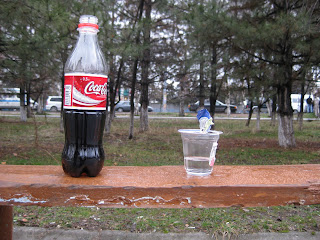Walking over to the town theatre, we saw that there was some sort of holiday concert taking place. The theatre looked packed and we instead hung out outside, eating ice cream and talking with an outgoing 12 year old Uzbek girl who took our picture and asked for Daniel’s phone number.
A look in the nearby park revealed the ultimate children’s paradise: a sort of metal spider merry-go-round and no adults in sight.


Every possible emotion was on display on this rusty playground equipment. Girls who were cheated out of a turn were crying. Boys standing on the bars were arguing and fighting. Kids hanging upside down from the swinging metal chairs were squealing with excitement. Everything was buzzing. And upon their discovery that four foreigners were approaching, the buzz turned into a rolling “Hello! What is your name! Hello! Hello! What is your name! Whatisyourname! Hellohello!”
Now if there is anything my travel photos usually show, it is my fear and hesitation to take pictures of people I encounter, especially children. But there was no way I could leave this park without capturing some memories of these loud and curious kids. The fact that they were also very curious about us, asking us to take their pictures and attempting to converse with us in our broken Russian, melted my usual reservations.
Kristen spent awhile taking pictures of these girls below and showing them the results. I think many of them were dressed up because of the holiday – note the big white bows. Brian was soon surrounded by a bunch of boys who wanted to play football.

I must say I had mixed feelings about creating such a scene among these kids; it could have been described as a bit of a zoo for everyone involved. But aside from the girl who asked for our autographs, we seemed to be just a passing interest to the children, who were quick to go back to jockeying for a good spot on the merry-go-round.

My first Kyrgyz souvenir

What is that oft-quoted saying about tourism? It is a fire that can cook your meals or burn down your house? With that in mind, Kyrgyzstan's Community Based Tourism, in theory, attempts to develop a tourist infrastructure throughout the country in a way that maximizes the benefit to the locals, or at least the locals involved in CBT. The CBT rep in Bishkek organized our homestay, and the office in Kochkar also helped us organize a driver back to Bishkek on Sunday. This was helpful, because when he later tried to rip us off, we could threaten to call the CBT rep and give him a bad review.
The CBT office is connected with Altin Kol (“Golden Hands”), which is a Kyrgyz women’s cooperative for Kyrgyz crafts and rugs. Kochkar, so says the guidebooks and the London School English teachers with 6 months experience, is the place in Kyrgyzstan to buy shyrdak, the traditional Kyrgyz rugs made from wool. The cooperative seems to be affiliated with the local chapter of CBT, “Community Based Tourism,” which has a good network in Kyrgyzstan organizing homestays and tourguides for tourists while attempting. The sign on the wall announced that the women who design and make the goods get a good chunk of of the purchase price after the cooperative’s overhead and taxes – I think about 75%.
They are colorful with large geometric patterns, and can be any size from a sitting pad to a room-sized rug. They also sell wool slippers, toys, ornaments, pillow cases and purses. While I am not usually drawn to the local “must-have” souvenir, I was drawn to this small sitting pad, which is supposed to prevent your uterus from freezing when you sit on the floor. I bought it for about $6. Haven’t gotten much use of it yet though, as I currently am in possession of a chair. Maybe it will get some use next year, when I’m a student living on Ramen at Wisconsin or potato puree in Ukraine, inshallah.
Brian and Kristen found a very beautiful rug with light green and white patterns, but decided to wait on it. I quite liked it myself, but fear that it is a little too early in my life to begin to collect rugs. Perhaps the selection will be better in the summer when the tourist season really starts. Perhaps one of you would like to visit me and so I can buy a rug and make you carry it back to the U.S. for me. Or perhaps I could save the money and instead get 12.5 one-hour private Russian lessons.








